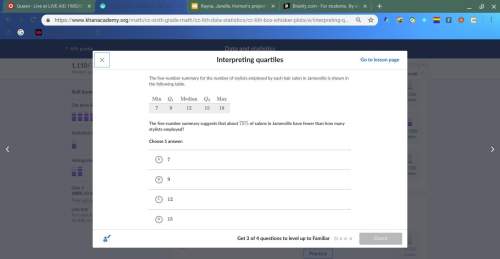
Mathematics, 29.10.2020 19:10 astultz309459
A scientist has 48 ounces of solution in a bottle. She used 1/6 of the solution in an experiment. How much of the solution did she use?

Answers: 3


Another question on Mathematics

Mathematics, 21.06.2019 12:30
Find the sum of the first 8 terms of the following sequence. round to the nearest hundredth if necessary.
Answers: 3

Mathematics, 21.06.2019 18:40
Airplane speeds are measured in three different ways: (1) indicated speed, (2) true speed, and (3) ground speed. the indicated airspeed is the airspeed given by an instrument called an airspeed indicator. a plane’s indicated airspeed is different from its true airspeed because the indicator is affected by temperature changes and different altitudes of air pressure. the true airspeed is the speed of the airplane relative to the wind. ground speed is the speed of the airplane relative to the ground. for example, a plane flying at a true airspeed of 150 knots into a headwind of 25 knots will have a ground speed of 125 knots. the problems below refer to static and dynamic pressure. static pressure is used when a body is in motion or at rest at a constant speed and direction. dynamic pressure is used when a body in motion changes speed or direction or both. a gauge compares these pressures, giving pilots an indicated airspeed. in problem #s 1 and 2, use the following information. the indicated airspeed s (in knots) of an airplane is given by an airspeed indicator that measures the difference p (in inches of mercury) between the static and dynamic pressures. the relationship between s and p can be modeled by s=136.4p√+4.5. 1. find the differential pressure when the indicated airspeed is 157 knots. 2. find the change in the differential pressure of an airplane that was traveling at 218 knots and slowed down to195 knots. in problem #s 3 and 4, use the following information. the true airspeed t (in knots) of an airplane can be modeled by t=(1+a50,000) ⋅ s, where a is the altitude (in feet) and s is the indicated airspeed (in knots). 3. write the equation for true airspeed t in terms of altitude and differential pressure p. 4. a plane is flying with a true airspeed of 280 knots at an altitude of 20,000 feet. estimate the differential pressure. explain why you think your estimate is correct.
Answers: 2

Mathematics, 22.06.2019 03:30
Aking and his army will attempt to capture a fortress. the left and right flanks break off from the main group to attack the west and east guard towers. suppose the left flank has a 60% chance of success and the right flank has a 75% chance of success, independently of one another. if both flanks capture their respective targets, then the king has a 98% chance of successfully taking the fort. if, however, only the left flank captures its tower, the king has an 80% chance of success; if only the right flank succeeds, the king has a 50% chance. if both flanks fail, then the king's chance of capturing the fort drops to 20%. it turns out the king captures the fort. what is the probability that one, and only one, flank was successful (either the left, or the right, but not both)? (round your answer to 3 decimal places)
Answers: 2

Mathematics, 22.06.2019 04:30
At the county fair, animals are judged for the quality of their breeding and health. the animal pens are arranged in an array, with one animal in each pen. a barn can hold at most 10 rows of pens and at most 6 pens in each row, with room for people to walk around them. what different ways can the planners of the county fair arrange the pens for the horses and cows in the same barn?
Answers: 3
You know the right answer?
A scientist has 48 ounces of solution in a bottle. She used 1/6 of the solution in an experiment. Ho...
Questions

History, 21.01.2021 04:40

Mathematics, 21.01.2021 04:40


Biology, 21.01.2021 04:40

English, 21.01.2021 04:40

Mathematics, 21.01.2021 04:40


History, 21.01.2021 04:40

Mathematics, 21.01.2021 04:40

Mathematics, 21.01.2021 04:40

Mathematics, 21.01.2021 04:40

Mathematics, 21.01.2021 04:40

Health, 21.01.2021 04:40


Mathematics, 21.01.2021 04:40

Arts, 21.01.2021 04:40




History, 21.01.2021 04:40




